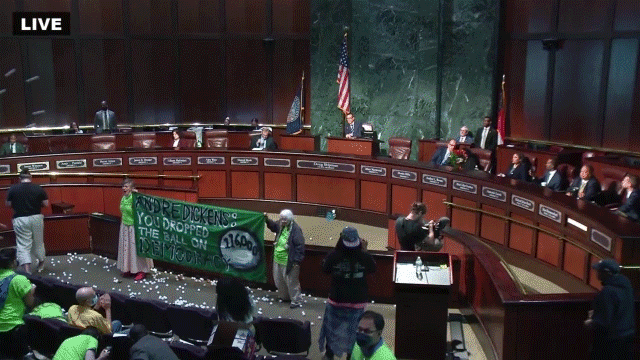Opponents of the Atlanta Public Safety Training Center, known as “Cop City,” have been actively protesting the construction of the facility. During a city council meeting, protesters threw ping-pong balls at council members while shouting their displeasure with the decision to proceed with the project. This action came after a year-long effort by organizers to gather over a hundred thousand signatures on a petition to have a referendum on the ballot allowing residents to vote on the facility. A federal lawsuit relating to the matter is pending, adding another layer to the controversy around the training center.
The protesters, including two older women with a sign criticizing Mayor Andre Dickens for not upholding democracy, used the ping-pong balls to represent the signatures collected for the referendum. The protest lasted about six minutes before the feed of the meeting was disrupted and later restored. Supporters of “Cop City” argue that the $90 million facility on 85 acres will provide better training facilities for police officers and address recruitment and retention challenges. However, opponents fear that the new center will contribute to increased police militarization and are concerned about its location in a majority-Black area.
The opposition to “Cop City” has been ongoing for several years, with protests sometimes turning violent and resulting in vandalism. The tension escalated after Manuel Esteban Paez Teran, also known as “Tortuguita,” was shot by state troopers in January 2023. A special prosecutor decided not to bring charges against the troopers, stating that the use of deadly force was reasonable. This incident and others have fueled the criticisms of the new training center, with city officials claiming that the protests have increased the cost of the project by approximately $20 million.
Despite the backlash and legal challenges, the construction of the Atlanta Public Safety Training Center continues to move forward. The protests and opposition from residents and activists show no signs of abating, highlighting the deep divides and concerns within the community regarding police training and militarization. The clash between protesters and supporters of “Cop City” reflects broader issues around policing, race, and community engagement in Atlanta. The outcome of the ongoing legal battles and public protests will shape the future of law enforcement training in the city and the relationship between the police force and the residents they serve.













